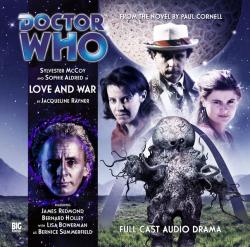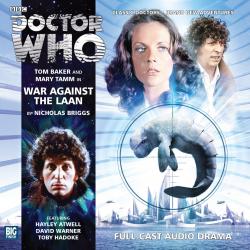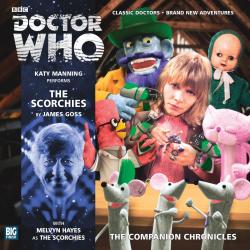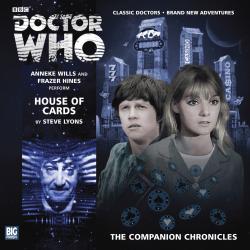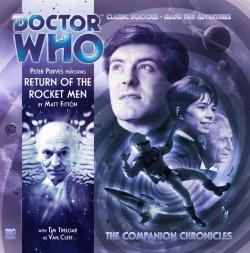The Justice of Jalxar (Big Finish)
Saturday, 13 April 2013 - Reviewed by Matt Hills
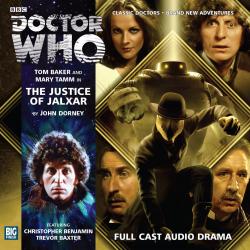
The Justice of Jalxor
Big Finish Productions
Written by John Dorney
Directed by Ken Bentley
Released March 2013
At long last, Henry Gordon Jago (Christopher Benjamin) and Professor George Litefoot (Trevor Baxter) are reunited with Tom Baker’s fourth Doctor. And there are more than a few nods to ‘The Talons of Weng-Chiang’ – that opiate of the fan masses – in John Dorney’s script, despite this otherwise being a stand-alone story rather than a definite ‘Talons’ sequel. The Doctor spends some time digging out his deerstalker and ensemble, much to Romana’s consternation; thanks to their ensuing dialogue this audio gets its visuals just right in the mind's eye. And there are even some familiar bread products available to toast a satisfactory outcome at story’s end. It’s a nostalgic wallow in 1970’s BBC Victoriana – the ideal backdrop for an adventure all about acquiring anachronistic artefacts, as Jago might say.
That the Doctor is accompanied this time by Romana rather than Leela does prevent this from being an all-round reunion, and in some senses it’s a shame that the basic story idea wasn’t held over by Big Finish, or pursued earlier, so that Louise Jameson as well as Tom Baker would’ve had the opportunity to revisit this milieu. However, the change in companion is marked by some lovely moments as Jago and Litefoot are suitably charmed by Romana, though having another character refer to her as an “ice maiden” does seem to hinge too strongly on fan knowledge and production/publicity cliché from back in the day, rather than being drawn out of actual story events and characterisations. Mary Tamm puts in another fine performance, engaging in plenty of banter with Baker, while the verbose alliterative tendencies of Jago (and Litefoot) are repeatedly pushed for their comedic value.
The story itself is rather predictable, and there’s little to relish in the way of Filipino armies advancing on Reykjavik. Whereas ‘Talons’ excelled at sketching in breathtakingly vast and genuinely surprising vistas in just a line or two of dialogue, The Justice of Jalxar doesn’t make such flowing use of what Piers Britton, in his book TARDISbound, refers to as the “epic vignette”. Jalxar's narrative plays out without huge surprises, featuring alien justice-serving technology that's been appropriated by a vigilante dubbed ‘the pugilist’. Although the overall narrative template isn’t earth-shattering, Dorney nevertheless has a lot of fun with its details, giving a very funny superhero gag to Romana, and rewriting one of Conan Doyle’s most famous lines from the Sherlock Holmes canon, as well as riffing on a plot point from A Study in Scarlet, not to mention 'A Study in Pink' more recently.
Jago and Litefoot are as delightful as ever, both as a double act and, separately, as foils to the Doctor and Romana. Part one builds to a precisely engineered, satisfying cliffhanger, though as this is only a two-part story we’re sadly deprived of any further cliffhanging action. If the measure of success is to leave your audience wanting more, then this is a resounding hit. Appearing right after The Sands of Life and War Against the Laan effectively formed a four-part story, I could happily have listened to another two episodes of Henry Gordon and Professor George getting lost in pea-soupers, exclaiming “lawks!” or “crumbs”, and generally offering a lot of mannered, pastiched fun. For true neatness, this could even have paralleled its TV counterpart by stretching to a box set release of three discs and six parts. But perhaps trying to directly emulate the form and reputation of its Hinchliffe-Holmes' model was deemed too high-risk, and what could have been Big Finish Baker gold is instead crafted as a less consequential two-parter. Beyond Jago and Litefoot, the guest cast are all excellent – particularly Mark Goldthorp as Bobby Stamford, who doesn’t have a tremendous amount to do, but sells key parts of the storyline very well.
There’s a startling instant where the fourth Doctor ponders his own guilty feelings, abruptly sounding more like his ninth or tenth incarnations. Baker’s performance modulates between deadly serious and gentle self-mockery, as if neither he nor director Ken Bentley are quite sure how to sell the gambit. If Jalxar technology detects the guilt people feel in their own innermost thoughts, then just how guilty would the Doctor seem to its detectors? Personally, I would’ve liked a deeper exploration of this and slightly less of the “passing wind in a built-up area” whimsy (hailing from the Doctor’s discussion of what people might feel a sense of guilt about). The story deflates any powerful focus on the Doctor’s character, but a new series-style tackling of the fourth Doctor’s woes, all that blood potentially caked on his scarf and his psyche, could have been darkly compelling in Baker’s more than capable hands, even if it might not have taken listeners comfortably back to a fabled 1970’s teatime. Whilst I like my Who to be as Proustian as the next fan, sometimes twenty-first century dramatic intensity is sadly passed over here in favour of better serving the talismanic 'Weng-Chiang'.
In essence, I simultaneously wanted this to be more like ‘Talons’ (a six-part blockbuster with greater implied scope) and less like ‘Talons’ (delving into the Doctor’s unearthly psyche). But in each case, I should confess my own guilt: it was still that rollicking great Bob Holmesian template which dominated my thoughts and responses. And therein lies the greatest injustice afflicting The Justice of Jalxar – it’ll probably always lurk in the giant rat-shaped shadow of a TV classic.
